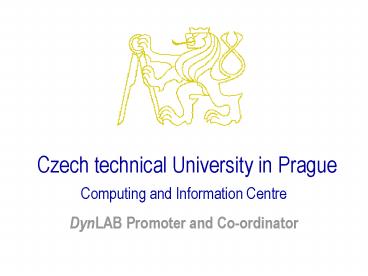Czech technical University in Prague
1 / 23
Title: Czech technical University in Prague
1
Czech technical University in Prague
- Computing and Information Centre
- DynLAB Promoter and Co-ordinator
2
CTU overview
- Founded 1707 (Charles University 1348)
- Faculties electrical, mechanical, civil and
nuclear engineering plus architecture (chemistry,
economics and agriculture now independent) - About 10 000 students and 3 000 employees all
over Prague - Computing and Information Centre supports ICTs
- Web is exploited for education by enthusiasts
only, but - students access to computers and Internet is
quite good
3
Our ICT exploitation in education
- The first true simulation software developed by
us after return from the University of Waterloo,
Canada 1969-70 - Since then our simulation software used as a
standard education tool by all electrical
engineering students - During seventies, fruitful collaboration with DTH
Lyngby - In 1985, first multidisciplinary predecessor of
DYNAST with all the key features (implicit
integration, semisymbolic analysis,
object-oriented hierarchical modeling ...)
4
DYNAST allows for submitting dynamic-system
models in the form of
- sets of nonlinear algebro-differential equations
in a natural textual form,
and/or - block and multipole diagrams in a graphical form
- While the block diagrams represent equations that
must be first set up manually, multipole diagrams
represent configuration of real systems so that
the underlying equations can be formed by a
computer automatically
5
DYNAST Solver
6
Two-level control designsupported by DYNAST
Control synthesis
Control objectives
functional level
Real-parts implementation
Model reduction
physical level
Control design verification
Controlled system
Plant to be controlled
7
Copying lathe
physical model
functional model
8
- From middle eighties, we organise seminars for
DYNAST users from academia and industry who
present their own applications - Comparison 1 in EUROSIM Simulation News Europe,
Nov. 1991, p.32 DYNAST 2000-times faster then
MATLAB - Since 1996 DYNAST made accessible across the
Internet - In 1996 installed TopClass virtual university,
upgraded, and later replaced by WebCT - DYNAST
became a part of the virtual university
environment
9
DYNAST on-line
10
- In 1998, we have learned from Learning about Open
Learning, a course given by the Institute of
Computer-Based Learning, Heriot-Watt University,
Edingburgh - In 1999, we were invited to establish the Virtual
Action Group on Multidisciplinary System
Simulation, a part of the IEEE Control Systems
Society TC on CACSD - At the same year, we started to co-ordinate the
Socrates ODL project called RichODL - Since 2001, we are using learning environments
developed by North Rhine-Westphalia universities
within the CampusSource initiative
11
DynLAB - Course on dynamics
of multidisciplinary
and controlled systems
in a virtual lab
- Ideas behind
a Pilot Project ?
12
Critique in Future Directions in Control
Education, IEEE Control Systems, Oct. 1999
Current control curriculum is
- exposing students to rigor math before motivating
them by practical engineering issues - presenting textbook problems carefully
engineered to fit the underlying theory - using computers to carry old exercises without
exploiting the computers efficiently
13
Considerations for control educationby S. D.
Bencomo Control Learning Present and Future, in
b02 IFAC plenary paper
- Automatic control education currently has a very
narrow approach ... - It is necessary to attach greater importance to
all the design cycle of a control system - Modelling and identification ... are a key factor
for achieving a good design ...
14
Our goal in DynLAB
- stirring up interest in dynamics
- introduction to dynamic modelling
- later formulation of system equations
- introduction to control design
- design of virtual experiments for teachers
15
Target groups of DynLAB
- young people - potential students of engineering
schools - engineering students wishing to complement the
traditional face-to-face courses - distance-education students at different levels
of vocational study and training - practising engineers in the context of their
continuing education or lifelong learning - teachers intending to innovate their courses on
dynamics and control
16
Innovated curriculum in DynLAB
- unified multidisciplinary modelling of dynamic
systems using dynamic diagrams - hands-on training in efficient modelling and
simulation of simple yet practical examples - equation formulation and solving - comparing
results with those of dynamic diagrams - topics more advanced mathematically only after
the learners are motivated sufficiently
17
Students will be supported by
- Web-based course on modelling and simulation
- keyword search engine and glossary
- on-line access to a simulation package
- collection of solved and resolvable problems
- on-line tutor monitoring, correcting and
activating - QAs and discussion forum
- knowledge-sharing problem solving support
18
Examples of key graphical representationson
which DynLAB is based
(a)
(b)
(c)
virtual experiment dynamic model
simulated response
19
Inverse pendulum experiment
from Control Tutorials for MATLAB OPEN LOOP
20
Inverse pendulum experiment
Control Tutorials for MATLAB http//www.engin.umic
h.edu/group/ctm/
21
Inverse pendulum experiment
CLOSED-LOOP CONTROL designed by
clients Matlab and simulated by server-based
Dynast across the Internet
22
Inverse pendulum experiment
Control Tutorials for MATLAB http//www.engin.umic
h.edu/group/ctm/
23
Cold rolling mill - a more complex model
controlled across the Internet































